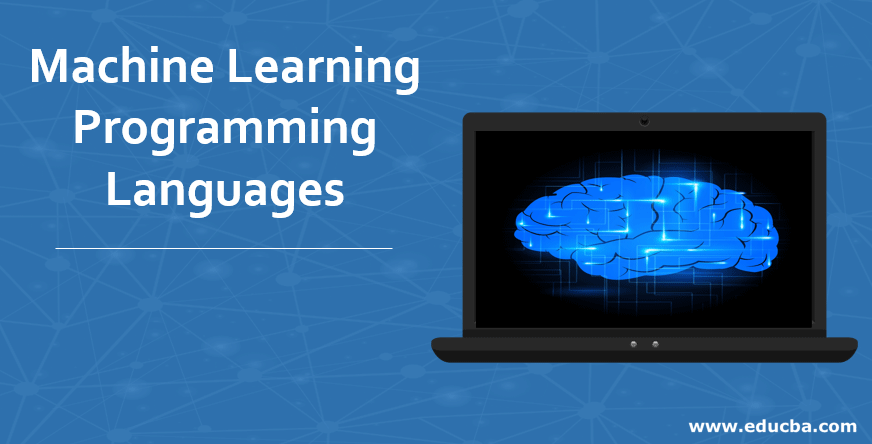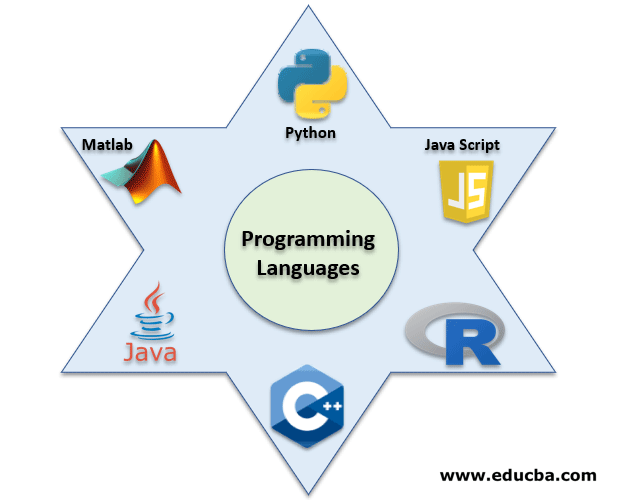Updated September 22, 2023
Introduction to Machine Learning Programming Languages
The following article provides an outline for Machine Learning Programming Languages. Machine Learning is adopted by most companies to build and improve their product and service. To implement these machine learning algorithms companies has a vast variety of programming language to choose from, i.e. Python, C++, JavaScripts, Java, etc. as each of these programming languages has their own unique feature, advantages, and disadvantages. It is good to have knowledge of more than one of them and based upon the type of application that is required by the organization-specific programming language should be chosen.
Top Machine Learning Programming Languages
Given below are the top most used popular programming language of machine learning:
1. Python
Currently the world’s fastest-growing language. Python was built for readability and ease of use. It uses the oops concepts but can be used as a scripting language as well. It is preferable for natural language processing and sentimental analysis. It has almost all the packages that are needed for machine learning tasks.
Check the table below for few of the machine learning library:
| Task | Library |
| Compute vision | OpenCV |
| Data pre-processing | Pandas |
| General-purpose machine learning | Scikit learn, TensorFlow, pytorch |
| data visualization | Matplotlib |
| Web application | django |
Along with these, we have Jupyter notebook which is specially made for python programming to check output for each line of code in real-time. In order to develop your own algorithm from scratch, you can use the matrix max library known as numpy and build your own machine learning algorithm. Python has a vast open forum community like stack overflow and GitHub. Google recently came up with an excellent free cloud service know as google Colab which you can use to build and train your network in python from scratch. It comes with GPU and TPU as well, which provides you the liberty to code in a low config system as well.
2. Java
Java is a general-purpose programming language, portable and among the most common language used in the world. It is preferable in the case when we want to have security and fraud detection in our application. Suppose the application is built in java and we want a small part of it to use machine learning then it is obvious to implement that part in java rather than going on to any other language. It is accepted by the people of the ML community due to the fact of marketability, readability, ease of maintenance, security and many others. It provides open-source libraries that are ready to use in the field of AI.
Few of the machine learning library used in Java for ML programming are:
| Library | Description |
| ADAMS | To control the flow of data in network. |
| Deeplearning4j | Provide support for deep learning algorithm. |
| ELKI | Data mining. |
| JSAT | Framework to easily start with machine learning. |
| MALLET | Used in areas like NLP, cluster analysis, text classification, etc. |
3. JavaScript
One of the most powerful web scripting language. If you need to run a machine learning application on the client-side in a browser then javascript is the best option. An advantage of machine learning running on the browser is that the client need not to install any additional library to use the application like the other languages. Google released its machine learning library for javascript i.e Tensorflow.js, it helps you develop a machine learning algorithm from scratch. API of it can be used to directly build and train your model in the browser. Think of running the web application that uses machine learning on your mobile application, doing so you can take advantage of the inbuilt sensor of the mobile data and use their data to train your models. Few of the other popular machine learning libraries are, Brain.js, ConvNetJS, Webdnn, Synaptic, etc.
4. C/C++
It is one of the oldest languages used to create high-performance applications. It provides high-level control over system resources and memory due to which its major use is in the development of applications on an embedded system. In the development of speech recognition, robot and games the widely used language is C/C++. So if you want to have an application with high performance then this will be a good option.
5. R
It’s a scripting language and is good to handle and visualize data which plays a key role in machine learning algorithms. R is majorly used in academics and research. It’s easy to learn and implement and is a good option to work with your data. If your data is not good you will never get a good result. R provides user-friendly data analysis and graphical models. Its domain is data analysis. It is preferred in statistical inference and has an active support forum. R comes up with the package which helps in improving the prediction accuracy. A few packages of R are Nnet, Caret, Rgl, Mgcv.
6. Matlab
Another easy to use programming language for beginners to experts in the field of Machine Learning is MATLAB. It takes a lesser line of codes compared to the other languages for the training and development of models for ML or DL. It provides interoperability with other open-source deep learning frameworks. One of the biggest drawbacks of MATLAB is its cost of License. It cost is too high and user need to pay for each module. Though It has wide and active communities like stack overflow, mathworks, github, etc. Now you must be having an idea of a few of the popular languages used in machine learning. Out of these if we talked about the global rank based upon the use then python is on top of the chart after which we have javascript, C/C++.
Conclusion
Will conclude this article by saying that it’s more important to learn the concepts of machine learning rather than the programming language. Because once you have your grasp on the concepts then based upon the application you want to develop you can choose the most suitable programming language.
Recommended Articles
This is a guide to Machine Learning Programming Languages. Here we discuss the basic concepts with the top 6 machine learning programming languages in detail. You may also look at the following articles to learn more –




